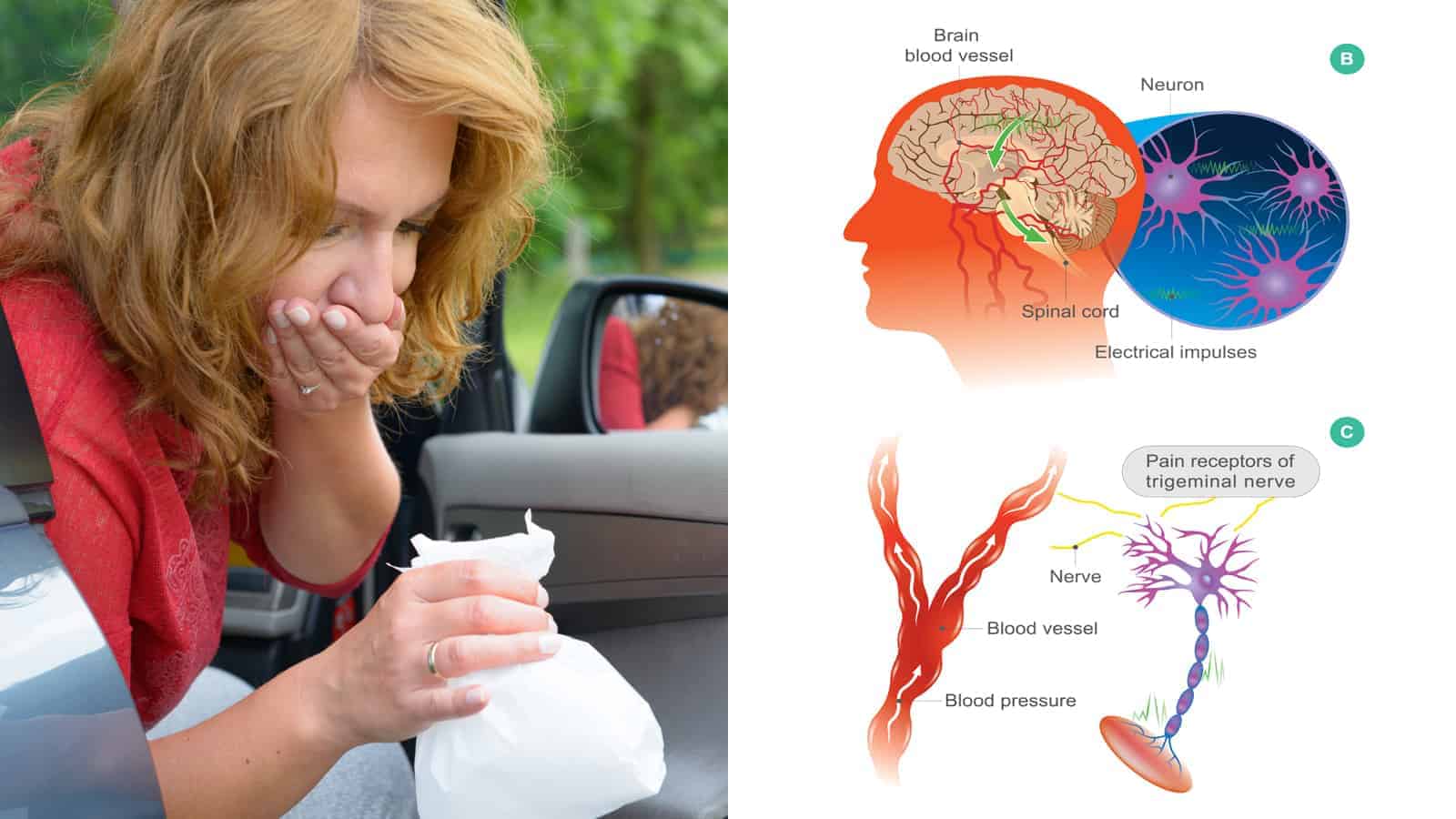A new study reveals that people who suffer from migraines also report more motion sickness. During a virtual rollercoaster ride, people who got migraine headaches suffered from dizziness and motion sickness more than others.
During the virtual rollercoaster ride, researchers also discovered that migraine sufferers had abnormal nerve cell activity in specific brain regions. Certain areas had increased nerve cell activity, while others had less activity. Researchers believe this dysfunctional processing of visual motion stimuli contributes to migraines and susceptibility to motion sickness. The new study was published in Neurology, the medical journal of the American Academy of Neurology, on July 7, 2021.
“Millions of people regularly experience painful and debilitating migraine headaches that can reduce their quality of life,” said study author Arne May, MD, Ph.D., of the University of Hamburg in Germany.
“People with migraine often complain of dizziness, balance problems, and misperception of their body’s place in space during migraine. By simulating a virtual roller coaster ride, our study found that some of these problems are not only magnified in people who experience migraines but are also associated with changes in various areas of the brain. By identifying and pinpointing these changes, our research could lead to a better understanding of migraine, which could, in turn, lead to the development of better treatments.”
Neurologists link motion sickness to increased migraine risk
The study included twenty people who suffered from migraines and 20 who did not. The average age of participants was thirty, and over 80% were women. The people with migraines had an average of four migraines per month.Using functional magnetic resonance imaging (fMRI), researchers took brain scans while watching videos to experience a virtual rollercoaster ride. No participants reported having a migraine while watching the videos. After the virtual experience, researchers asked participants about their levels of dizziness, motion sickness, or other symptoms.
They found that 65% of migraine sufferers experienced dizziness compared with 30% from the other group. Researchers also gave the study groups a questionnaire on motion sickness, scoring symptom intensity from 1-180.
Those with migraines had an average score of 47 compared to 24 in people with no migraines. Migraine sufferers also experienced unpleasant symptoms longer, with an average of 1 minute and 19 seconds. The other group’s symptoms lasted an average of 27 seconds. Not surprisingly, the migraine group reported more intense symptoms than the second group.
Abnormal processing of visual motion stimuli in the brain is to blame
After analyzing the brain scans, researchers pinpointed changes in nerve cell activity by observing blood flow in the brain. Those with migraines had more activity in five areas of the brain:
- two areas in the occipital gyrus (superior and inferior)
- pontine nuclei
- cerebellar lobules V/VI
They observed decreased brain activity in the cerebellar lobule VIIb and middle frontal gyrus. Researchers found that these changes in visual processing areas of the brain correlated with migraine and motion sickness symptom scores.
“One other area of the brain where we found pronounced nerve cell activity in people with migraine was within the pontine nuclei, which helps regulate movement and other motor activity,” said May. “This increased activity could relate to abnormal transmission of visual, auditory, and sensory information within the brain. Future research should now look at larger groups of people with migraine to see if our findings can be confirmed.”
The German Research Foundation funded this study.
It’s clear that more research is needed to understand the links between motion sickness and migraines better. However, scientists believed they found the culprit behind both of these conditions.
The Serotonin Factor
Another study published in Neurology in 2005 discovered that low serotonin levels might contribute to migraines and motion sickness. Many drugs that treat migraines lead to elevated serotonin levels. We know that people with migraines report more motion sickness episodes, suggesting that low serotonin is the common denominator.
For the study, investigators recruited 39 people with migraine headaches and 37 people without the condition. They gave both groups tryptophan, a key ingredient involved in making serotonin. The researchers gave half of each group capsules and a protein drink without tryptophan. The other half received capsules and a balanced protein drink containing tryptophan.
Next, the researchers attempted to induce motion sickness in the participants. They had them sit in a chair with their head inside a rotating drum painted with vertical black and white stripes. When the drum rotated, it created the illusion of spinning. Researchers rotated the drum 10 times per minute for 15 minutes or until the subject felt nauseous. Participants rated their nausea, dizziness, and headache on a scale of 1 to 10 before the experiment and every 3 minutes while the drum rotated.
Study results
Migraine sufferers who received a protein drink with tryptophan asked to stop the experiment three minutes earlier than people without migraines who got this drink. They also had higher nausea, motion sickness, and headache rates than non-migraine sufferers both before and during the experiment. This held regardless of which drink they got.
However, the tryptophan-free drink caused similar motion sickness intensity in both groups. This suggests that a lack of serotonin increases motion sickness symptoms. Because people with migraines already have lower serotonin, this suggests that lowering them further with the tryptophan-free drink had no effect. So, the suppressed serotonin levels may contribute to both motion sickness and headaches in migraine sufferers.
Final thoughts on a study linking motion sickness to increased risk for migraines
A new study by the American Academy of Neurology found that people who suffer from migraines report more motion sickness. Abnormal activity in nerve cells within the brain may explain this phenomenon. During a virtual rollercoaster ride, participants had increased or decreased activity in five areas of the brain. These regions are responsible for processing visual motion stimuli.
Researchers hope that by pinpointing these changes in the brain, better treatments will emerge for migraine sufferers in the future. A related study also suggests that low serotonin levels could exacerbate motion sickness in people with migraines.
















 Community
Community

